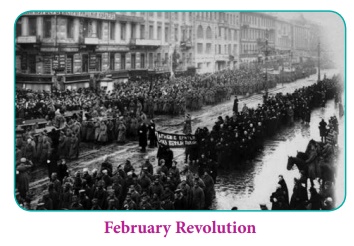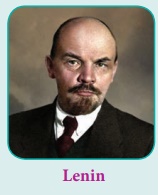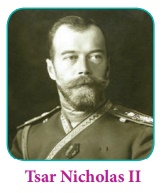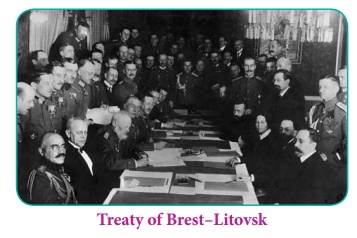Imperialism and its Onslaught | History - Russian Revolution and its Impact | 12th History : Chapter 13 : Imperialism and its Onslaught
Chapter: 12th History : Chapter 13 : Imperialism and its Onslaught
Russian Revolution and its Impact
Russian Revolution and its Impact
Introduction
The most significant outcome of the First World War
was the Russian revolution. The Tsarist government in Russia was faced with
unbearable strains in the First World War. People went hungry. Cities and towns
were filled with workers who could not be adequately fed and housed. In March
1917, there erupted the first revolution (February Revolution) with strikes and
demonstrations in Petrograd. The first revolution did not solve any of Russia’s
problems. Though the Russian monarchy was overthrown, the interim government
carried on the war. Therefore there was a second great uprising in November
(October revolution) in which the Bolsheviks under the guidance of Lenin,
seized power and established a communist government in Russia.

(a) Causes of the Revolution Autocratic Rule of Tsars
In the nineteenth century, Russia was a backward
country ruled by a series of autocratic Tsars. They kept Russia economically
and socially backward. Serfs were persecuted and lived miserable lives.
Anti-Semitism was rife with the persecution and massacre of Jews. There was no
space for democratic dissent. Intellectuals, university professors, students, scientists
and writers suffered imprisonment and exile for expressing opinions. The Tsars
were universally hated and everyone looked forward to their downfall.
Vladimir Ilyich Lenin
(1870–1924): Lenin was born near the
Middle Volga. In 1887 his eldest brother was hanged for taking part in an
attempt on the Tsar’s life. Influenced by the ideas of Karl Marx, Lenin
believed that the way for freedom was through mass action. He spent his time
taking classes for study groups of factory workers in St Petersburg on Marxism.
Arrested in 1895 he was kept in Siberia. After his release in 1900, he moved
from one boarding house to another in the big cities of Europe. In 1903 a
congress of forty-three delegates of the Social Democratic Party, the chief
party of the left, moved to London. Here the congress split on the issue of
organisation and strategy. Lenin gained the support of a small majority (bolshinstvo), known as Bolsheviks, which
became the Bolshevik Party. His opponents, in a minority (menshinstvo), were called Mensheviks.

Conditions of Peasantry
Russia was basically a peasant society. Nearly
one-half of the population were serfs tied to the land. Russian peasants were
forced to labour on their lords’ lands for a few days every week without any
payment, and were not allowed to marry without the consent of the lords. Serfs were
punished severely even for minor faults.During the reign of Nicholas I, there
were more than five hundred serf riots in various parts of Russia, but they
were all crushed ruthlessly. Alexander II issued an edict of emancipation in
1861 and freed the serfs. But they were not provided with land to eke out their
livelihood. So the peasants became the combustible material for the revolution.
Industrial backwardness and abominable living condition of working class
Russia began to industrialise late. Russia lagged
behind all great European powers. Russian workers laboured under oppressive
conditions. Trade unions and strikes were completely banned. The Russian
working class was looking for an opportunity to protest.
Role of Nihilists
The young, radical and non-gentry intellectuals who
waged a merciless war against the Russian state were called Nihilists by their
enemies. The first unsuccessful attempt on the life of Tsar Alexander II and
innumerable trials that followed dubbing the suspected intellectuals as nihilists
and sending them, both men and women, to Siberia did not stop their
revolutionary activities in Russia. Revolutionary forces swelled, as many
minority groups such as the Jews and Poles joined them.
Nihilism represented a revolt against
the established social order. It rejected all authority exercised by the state,
by the church and by the family. It based its belief on nothing but scientific
truth.
Marxism and Its Influence
Marx and Engels held the firm view that the
existence of the bourgeoisie was as
necessary a condition for the Socialist revolution as the proletariat. They
never envisaged the possibility of a successful Socialist revolution in
backward Russia. However, Marxist ideas, apart from other radical ideas such as
anarchism and various forms of socialism, gained ground in a situation were
living conditions were oppressive. But Marxist groups were in the lead, and in
Lenin they found a charismatic leader with great organisational skills.
Autocracy of the Tsar Nicholas II
Tsar Nicholas II of the Romanov dynasty had little
experience of government. His wife Alexandra was a dominant personality and
Nicholas was under her strong influence. Determined that Russia should not be
left out in the scramble for colonial possessions, Nicholas encouraged Russian
expansion in Manchuria, provoking a war with Japan in 1904. The resulting
Russian defeat led to strikes and riots. Opposition to the Tsar grew.

On 23 January 1905 Father Gapon, organised a march
of men, women and children. The processions were peaceful and unarmed, with
demands for a representative national assembly, and agrarian and industrial
reforms. But police and soldiers fired on the procession. Hundreds were killed
and many thousands wounded. The events of this day (known as Bloody Sunday) led
to riots, strikes and violence in which the governor-general of Moscow, was
killed by a bomb.
Nicholas was forced to grant a constitution and
establish a parliament, the Duma. This was no longer satisfactory to the
left-wing parties that formed a soviet (council) of workers’ delegates in St
Petersburg. Similar soviets were set up in other cities. The Duma gave the
middle classes, a voice in government. So the moderates were supportive of the
government’s policy, while the left wing continued their opposition. But
whenever the Duma opposed any initiative of the Tsar, it was dissolved and
fresh elections were held. Without change of government policy, the fourth Duma
ended with the revolution of 1917.
Opposition to the Tsar and Dissolution of Duma
The outbreak of the First World War had temporarily
strengthened the monarchy, as Russia was allied to France and Britain. As there
was a rumour of a palace revolution, Nicholas made himself the
Commander-in-Chief of his army and was making a mess of everything. Towards the
end of 1916, Rasputin, a domineering influence over the Tsar and the Tsarina,
was murdered creating a crisis in the palace. Members of the St. Petersburg
Soviet were arrested.
Popular Uprisings
As late as on 23 February 1917, when the socialists
celebrated International Working Women’s Day, the Tsar seemed unchallengeable.
But he had to abdicate on the morning of 2 March. Though none called for
strikes, the bread shortages among women textile workers, with their husbands
in the army, forced them to go on strike anyway and march through the factory
areas of Petrograd. Masses of women workers in a militant frame of mind
demanding “Bread for workers” waved their arms towards factory workers and
shouted “Come out!” “Stop work!” The city’s 400,000 workers joined the movement
the next day (24 February).
Abdication of Tsar
The government used the military to break the
strike. But on the fourth day of strikes and demonstrations mutinies broke out
even in the barracks. The Tsar declared martial law. But his order was not
broadcast in the city, as there was no one to do this job. The Tsar then tried
to return to Petrograd. The railway workers stopped his train on the way.
Frightened by these developments, the generals at the front and some leaders in
Petrograd, pleaded with the Tsar to abdicate. On 15 March, a week after the
popular uprisings, Nicholas II abdicated.
Provisional Government
There were two parallel bodies to take on
government functions. One consisted of bourgeois politicians of the old state
Duma, representing the propertied classes. On the other were the workers’
delegates drawn together in a workers’ council, or Soviet. The soviets were
influenced by the underground left-wingers. Those in the Duma were able to form
a provincial government with the consent of the soviets. The soviets were
dominated by Mensheviks and the minority Bolsheviks were undecided. The
situation changed with the arrival of Lenin.
Failure of the Provisional Government
Lenin was in Switzerland when the revolution broke
out. Lenin wanted continued revolution. His slogan of ‘All power to the
Soviets’ soon won over the workers’ leaders. Devastated by war time shortages,
the people were attracted by the slogan of ‘Bread, Peace and Land.’
The Provisional government made two grave mistakes.
It postponed a decision on the demand for the redistribution of land apart from
deciding to continue with the war. Frustrated peasant soldiers deserted their
posts and joined those who had resorted to land grabbing. This intensified the rising
in Petrograd led by the Bolsheviks. The government banned the newspaper Pravda and arrested all Bolsheviks
except Lenin who was in hiding in Finland. Leon Trotsky was also arrested.
Kerensky became prime minister, leading a new coalition of liberals and
moderate Socialists. Faced with an attempted coup Kerensky tried to dismiss
both the government and the Soviet. His attempts were frustrated by the Soviet
and particularly by the Bolsheviks who had by then attained popularity.
Pravda is a Russian word meaning “Truth”. It was the official newspaper
of the Communist Party of the Soviet Union from 1918 to 1991.
Takeover by the Bolshevik Party under Lenin’s leadership
In October Lenin persuaded the Bolshevik Central
Committee to decide on an immediate revolution. Trotsky prepared a detailed
plan. On 7 November key government buildings, including the Winter Palace and
the Prime Minister’s headquarters, were seized by armed factory workers and
revolutionary troops. On 8 November 1917 a new Communist government was in
office. Its head was Lenin. The Bolshevik Party was renamed the Russian
Communist Party.
Outcome of the Revolution
Lenin thought the most important factor for the
fall of the Provisional government was its failure to withdraw from the War. So
Lenin immediately appealed for peace. Unmindful of the harsh terms dictated by
the Central Powers, Lenin opted for withdrawing from the War to concentrate on
the formation of a new government. In March 1918 the Treaty of Brest– Litovsk
was signed.

Influence of the Russian Revolution
The revolution fired people’s imagination across
the world. In many countries, communist parties were formed. Soviet Union
encouraged the colonies to fight for their freedom and gave all out support to
them. Debates over key issues, land reforms, social welfare, workers’ rights,
gender equality started taking place in a global context.
The rapid progress made by the Soviet Union in the
decades after the revolution inspired backward countries across the world, and
provided an alternative to capitalism. Illiteracy and poverty were eliminated
in record time. Industry and agriculture developed remarkably, and the Great
Depression which affected the entire world made no impact on the USSR. Women
were given equal rights. Industries and banks were nationalised. Land was
declared as social property and distributed among poor peasants.
Related Topics